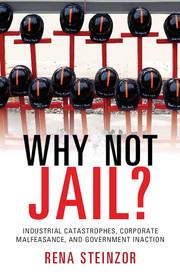Part Three - Solutions
Published online by Cambridge University Press: 05 December 2014
Summary
Judge Rakoff’s Lament
In a short essay that sent shockwaves through the contentious world of prosecutors, judges, defense attorneys, and corporate counsels, federal district court Judge Jed Rakoff wondered recently why no bank executives have been prosecuted for causing the 2008 economic meltdown. Rakoff, considered a maverick by his friends and an iconoclast by his foes, noted that the five-year statute of limitations (deadline) for such prosecutions would soon arrive. Careful to acknowledge that he is not privy to all the facts, the judge nevertheless managed to skewer prosecutorial timidity while professing sardonic bewilderment:
I have no opinion whether any given top executive had knowledge of the dubious nature of the underlying [subprime] mortgages, let alone fraudulent intent.
But what I do find surprising is that the Department of Justice should view the proving of intent as so difficult in this case. Who, for example, was generating the so-called “suspicious activity reports” of mortgage fraud that, as mentioned, increased so hugely in the years leading up to the crisis? Why, the banks themselves. A top-level banker, one might argue, confronted with growing evidence from his own and other banks that mortgage fraud was increasing, might have inquired why his bank’s mortgage-based securities continued to receive AAA ratings. And if, despite these and other reports of suspicious activity, the executive failed to make such inquiries, might it be because he did not want to know what such inquiries would reveal?
This, of course, is what is known in the law as “willful blindness” or “conscious disregard.” It is a well-established basis on which federal prosecutors have asked juries to infer intent, including in cases involving complexities, such as accounting rules, at least as esoteric as those involved in the events leading up to the financial crisis.
Information
- Type
- Chapter
- Information
- Why Not Jail?Industrial Catastrophes, Corporate Malfeasance, and Government Inaction, pp. 217 - 222Publisher: Cambridge University PressPrint publication year: 2014
